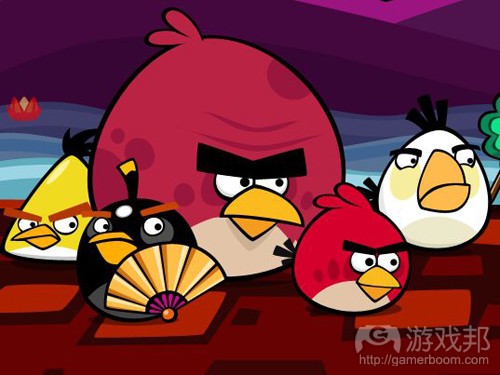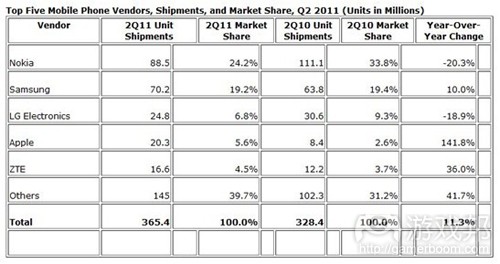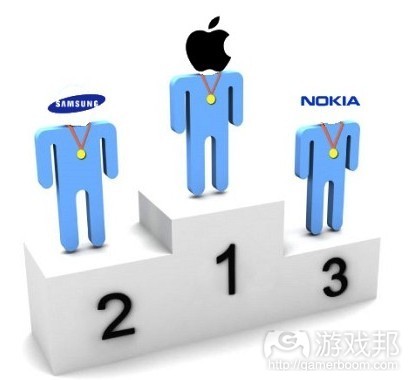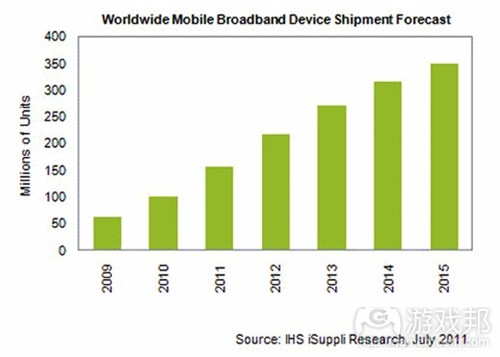每日观察:关注IDC第二季度手机出货量报告(7.30)
1)芬兰开发商Rovio日前宣布与中国亿动广告传媒(Madhouse)合作,扩大《愤怒的小鸟》在中国市场的影响力。
Rovio已在今年5月与当乐网合作在中国发售《愤怒的小鸟》,但因盗版游戏的盛行,官方版游戏销量并不乐观。Rovio称希望本次与亿动广告传媒的合作,能够进一步扩大该游戏品牌影响力,并预测到今年底这款游戏在中国下载量将达1亿次。
Rovio首席营销官Peter Vesterbacka表示,公司将针对这一市场开发富有当地特色的周边产品,为中国粉丝带来更多乐趣。
2)原先靠电脑游戏起家的PopCap公司日前表示,他们正考虑转变平台发展策略。该公司高级制作人Matt Johnston在媒体采访中称,公司尚未公开的新项目将会与以往更为不同。他们现在的做法是锁定一个核心游戏平台A,根据最大众化的输入机制创建游戏,但也会考虑将其移植到平台B,他们会确保这种移植过程更为轻松简便,无需过度耗费工时。
据称《植物大战僵尸》从PC移植到其他平台时极费精力,PopCap现在打算缩减这个过程,以便节省更多时间开发更多游戏。
3)IDC最新数据指出,诺基亚仍是今年第二季度的世界手机市场冠军,其手机出货量共达8880万部(游戏邦注:但已比去年同期下降20.3%),其中智能手机占19%。三星手机出货量在同一时期上升了10%,其中智能手机出货量占27%以上。
第三名是LG,手机出货量达2480万部,尽管比上一季度上升50%,但最近仍亏损5100万美元。
表现最为抢眼的是位居第四的苹果,得益于中国市场对iPhone 4的庞大需求,其手机出货量比去年飙升了141.8%。
排在第五名的是中国中兴通讯,该季度手机出货量达1650万部,同比增长36%。
4)分析公司Strategy Analytics最近发布报告表明,苹果已成今年第二季度的全球智能手机销量冠军,紧随其后的是三星,而手机之王诺基亚只能屈居第三。苹果在该季度的iPhone销量达2030万部,其中多数为问世仅一年的iPhone 4;三星智能手机同期的销量则是1900万部,诺基亚是1670万部。
该公司预测今年的智能手机市场规模将比去年增长76%,不少功能性手机用户开始晋升为智能手机用户,Android智能手机将继续推动这一市场的发展。
5)市场调研公司IHS iSuppli报告指出,平板电脑将占今年所有移动连网设备(游戏邦注:其他此类设备还包括上网本和笔记本电脑)出货量的57.8%。预计今年平板电脑出货量将达5900万部,比去年的1740万部增长239%。
去年所有的移动连网设备总体出货量为1.001亿部,预计今年将达1.58亿部,到2015年这一数据将增长至3.5亿部,复合年增长率为28.5%。
6)Outfit7工作室首席执行官Andrej Nabergoj日前宣布离职,在找到正式接班人之前,将由该公司创始人Samo Login担任临时CEO。
该公司应用下载量目前已突破1.5亿次,Nabergoj曾在1月份表示美泰公司历时50年才售才10亿多个芭比娃娃,他认为Outfit7今年就可售出5亿件玩具。
7)西雅图游戏开发商PressOK Entertainment公司日前发布一项基于地理位置的新服务PlacePlay,支持iOS开发者在游戏中添加本地竞赛等设置,让玩家与同一街区的其他用户过招对决。除此之外,PlacePlay还提供了与地理位置有关的虚拟商品、目标、成就等元素。(本文为游戏邦/gamerboom.com编译,如需转载请联系:游戏邦)
1)Rovio: Chinese Angry Birds Will See 100M Downloads
by Mike Rose
Angry Birds developer Rovio has announced a partnership with Chinese mobile ad network Madhouse, as a means of expanding the hit game’s presence in China.
Angry Birds officially launched in China in May through a partnership with Chinese mobile games network Downjoy, but sales from such official efforts in the highly-populated country have so far been dwarfed by derivative knock-offs and pirated versions on jailbroken iPhones.
Rovio hopes that this partnership will help the brand to properly take off in the region, and is predicting that it will have seen 100 million downloads of Angry Birds in China by the end of 2011.
China will also see Angry Birds official products popping up too, including a line of shoes based on the game at Letao, China’s largest online shoe company.
Peter Vesterbacka, Rovio’s chief marketing officer, explained, “As we have done in all of our markets around the world, we will create products specifically for this market. Angry Birds will recognize the uniqueness of China and our Chinese fans.”
He continued, “We are delighted to be fully operational in China. China has great potential for growth, but just as exciting is the opportunity to build a creative franchise, a marriage of virtual and real life, that is special for China and exciting for our Chinese fans.”(source:gamasutra)
2)PopCap: Next Project Will Bring Major Changes To Dev Process, Thanks To Touch
by Staff
PopCap has typically started with PC for its games and then ported to other platforms, but the success of iOS has forced the studio to rethink that measure, reveals senior producer Matt Johnston as part of a new Gamasutra feature interview.
Last year, PopCap co-founder John Vechey had some harsh words for company’s mainstay, downloadable PC games: “Downloadable [PC] games are irrelevant. We only work on them because they work well to go to other platforms.” But even that seems to be changing.
Describing the company’s “platform philosophy” as part of a new interview, PopCap’s senior producer of core IP, Matt Johnston told Gamasutra that things are changing more drastically with the company’s new, unannounced project.
Touch interfaces have changed things so drastically that, he says, developers would “have to have [their] head[s] in the sand to at least not consider.”
For the company’s new game, says Johnston, “the way that I’m directing the team is, we have a lead platform, but we’re actually going to do something pretty different, which is we’re going to build our game to be as accepting of the main, dominant input mechanisms out there.”
“So we’re going to build our game for platform A as the lead platform, but we’re also going to build our game so that it also considers platform B, and that the adaptation process is a little bit more smooth, and it’s not as work-intensive,” he says.
Games like Plants vs. Zombies debuted on PC first before being painstakingly ported to other platforms — a process that takes a long time for the company. “PVZ XBLA was a project that I worked on, and the first thing I did was get those guys to figure out the control scheme, because that was a big question; like, ‘Is this even going to work?’ And it wasn’t like, ‘make it work’, it was like ‘let’s see if it works, and if it doesn’t work we’re not going to do it.’ And we actually took a long time trying to get it to work,” says Johnston.
This time around, the team hopes to “close the gap” between versions thanks to a more agnostic approach to input. “…it makes business sense for us, and it makes good sense for us, just in terms of getting people what they want. So we’re trying to make that a little bit easier for us, so we can get more games out to these people,” says Johnston. (source:gamasutra)
3)Nokia remains largest mobile manufacturer despite 20% slip in shipments
by Keith Andrew
Strategy Analytics may have detailed Apple’s ascent to the top of the smartphone charts, but there’s still no shifting Finnish rival Nokia as the world’s top mobile manufacturer.
That’s despite a 20 percent year on year slide in shipments, falling to 88.8 million units across the most recent quarter according to IDC figures.
Feature phones first
It’s the comparison between Nokia’s smartphone shipments detailed by Strategy Analytics and IDC’s take on the firm’s overall business that’s most telling.
Nokia’s continued dominance of the feature phone market is undeniable, but its position in the face of iOS and Android is weakening as the quarters pass.
It’s closest rival Samsung saw overall shipments jump 10 percent.
However, it’s Samsung’s smartphone business that’s driving the Korean firm’s ascent, making up more than 27 percent of Samsung’s shipments throughout the quarter.
In contrast, smartphones make up 19 percent of Nokia’s shipments.
Loss for LG
“The shrinking feature phone market is having the greatest impact on some of the world’s largest suppliers of mobile phones,” said senior research analyst Kevin Restivo.
“Stalwarts such as Nokia are losing share in the feature phone category to low-cost suppliers such as Micromax, TCL-Alcatel, and Huawei.”
Both Nokia and Samsung are miles ahead of the competition, however.
In third spot is LG, with 24.8 million units sold. The firm recently posted a $51 million loss, despite a 50 percent rise in shipments from the previous quarter.
Eyes on Apple
It’s Apple that will generate the most headlines, owing to 141.8 percent jump in shipments year on year.
The Cupertino firm is said to be thriving in China owing to strong demand for iPhone 4.
Interestingly, Apple is also generating momentum in developing economies – markets typically dominated by both Nokia and, more recently, fifth placed firm ZTE.
The Chinese manufacturer enjoys a strong presence in its home market, but its appeal broadened out worldwide in the most recent quarter, with shipments up 36 percent to 16.5 million units.(source:pocketgamer) http://www.pocketgamer.biz/r/PG.Biz/IDC+news/feature.asp?c=31944
4)Best-selling smartphone company of the last quarter: Results are in
By Mat Smith
As Nokia attempts to reinvent its catalogue of phones for the smartphone age, it’s been usurped, and kicked on the way down, by Apple and Samsung.
Falling from the top spot to third, this ends 15 years at the top for Nokia, with the publishing of smartphone sales from the second quarter of 2011.
Apple claimed first place, selling 20.3 million iPhones, presumably mostly the iPhone 4, now past its first birthday, whilst Samsung have announced a very healthy 19 million devices sold.
Nokia sold 16.7 million smartphones, and are now pinning its hopes on the technically impressive N9, and it’s as-of-yet unseen range of smartphones running Windows Phone 7. Financial results recently published are difficult reading for plenty of Nokia fans.
Talking to Reuters, Neil Mawston analyst at Strategy Analytics said: “Samsung’s Galaxy portfolio has proven popular, especially the high-tier S2 Android model.”
Strategy Analytics have estimated that the smartphone market would grow 76 percent from a year ago, and it seems that customers are increasingly trading in their feature phones. Given the massive push by phone-makers and phone networks for sub-£100 smartphones – especially running Google’s Android operating system – expect smartphone sales to explode this year.(source:recombu)
5)IHS iSuppli: Tablets to push 2011 mobile broadband shipments up 58%
Devindra Hardawar
Strong tablet sales this year will help increase the shipment of devices that connect to mobile broadband — basically everything connecting to cellular networks that’s not a smartphone — by 57.8 percent, research firm IHS iSuppli reports.
Other devices in the category include mobile broadband-equipped netbooks and laptops, but it appears that tablets will continue to be the driving force. Tablet shipments are expected to hit around 59 million units this year, up 239 percent from last year’s 17.4 million figure, according to IHS.
“[Tablets are] affecting everything from supply ecosystems to chipset design, to services, applications and business models. [They] are spurring innovation not just in the wireless sector but also across multiple industries,” Francis Sideco, principal analyst for wireless research at IHS said.
Overall shipments of mobile broadband devices are expected to hit around 158 million units this year, up from 100.1 million last year. IHS predicts that mobile broadband devices shipments will reach 350 million units by 2015 (see chart below), using a compounded growth rate of 28.5 percent.
Apple’s iPad is the undisputed tablet leader at the moment, but the next few years could see some Android tablets gaining a decent following of their own.(source:venturebeat)
6)Outfit7 CEO Nabergoj Steps Down, Founder Login Steps Up As Temporary Replacement
By Kim-Mai Cutler
Outfit7 has been one of the high-flying, bootstrapped mobile developers on iOS and Android this year with north of 150 million downloads for its talking animal apps.
So it’s surprising to hear that the company’s chief executive Andrej Nabergoj is stepping down. Asked what he’ll be doing next, he said, “Wait and see.” The company’s founder Samo Login is stepping up as the temporary CEO until the company can find a permanent replacement.
Built by former search engineers in Slovenia, Outfit outlined a lofty vision for itself. The company’s ambitions have been to reinvent the toy industry, using smartphones and tablet devices as their platform. Nabergoj had said in the past that kids are naturally drawn to iPhones and iPads over other kinds of toys.
“It took Mattel 50 years to sell more than 1 billion Barbie dolls,” he told us in January. “This year, we think we can ship 500 million toys.”(source:insidemobileapps)
7)PressOK’s PlacePlay Lets Developers Integrate Location Features And Local Advertising Into Games
Rip Empson
Seattle-based PressOK Entertainment, a game development company, launched an interesting new service this week in public beta called PlacePlay, which the startup describes as a “location enablement platform” for games. Location is something that hasn’t really been explored much in gaming as of yet, so simply put, PlacePlay aims to tackle the obstacles that prevent location from becoming a relevant facet of the games we play every day.
For starters, the platform is focused on giving game developers the ability to quickly add local tournaments into gameplay, so that a user can, for example, play a virtual game of Battleship with other players that live on the same block. Though tournaments are the primary feature of the platform at this point, PlacePlay also supports location-based virtual goods, objects, achievements, and more.(source:techcrunch)













































 闽公网安备35020302001549号
闽公网安备35020302001549号